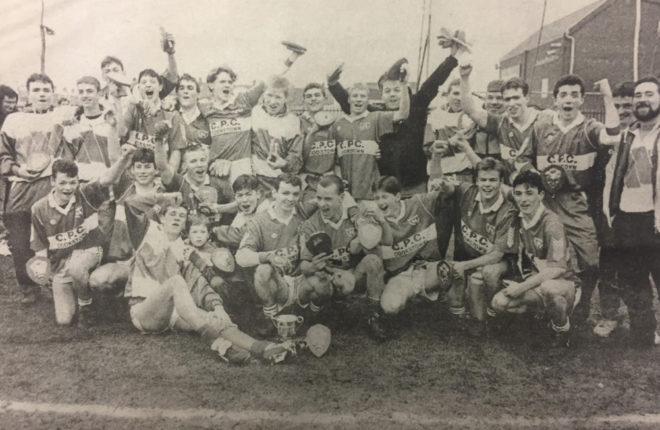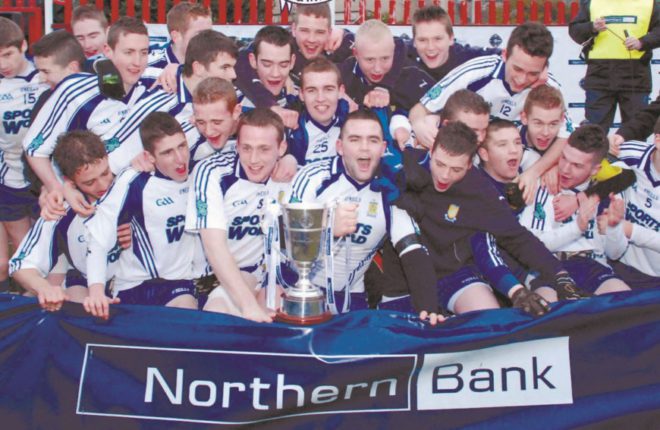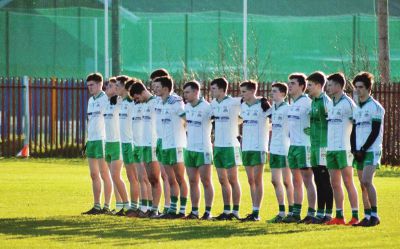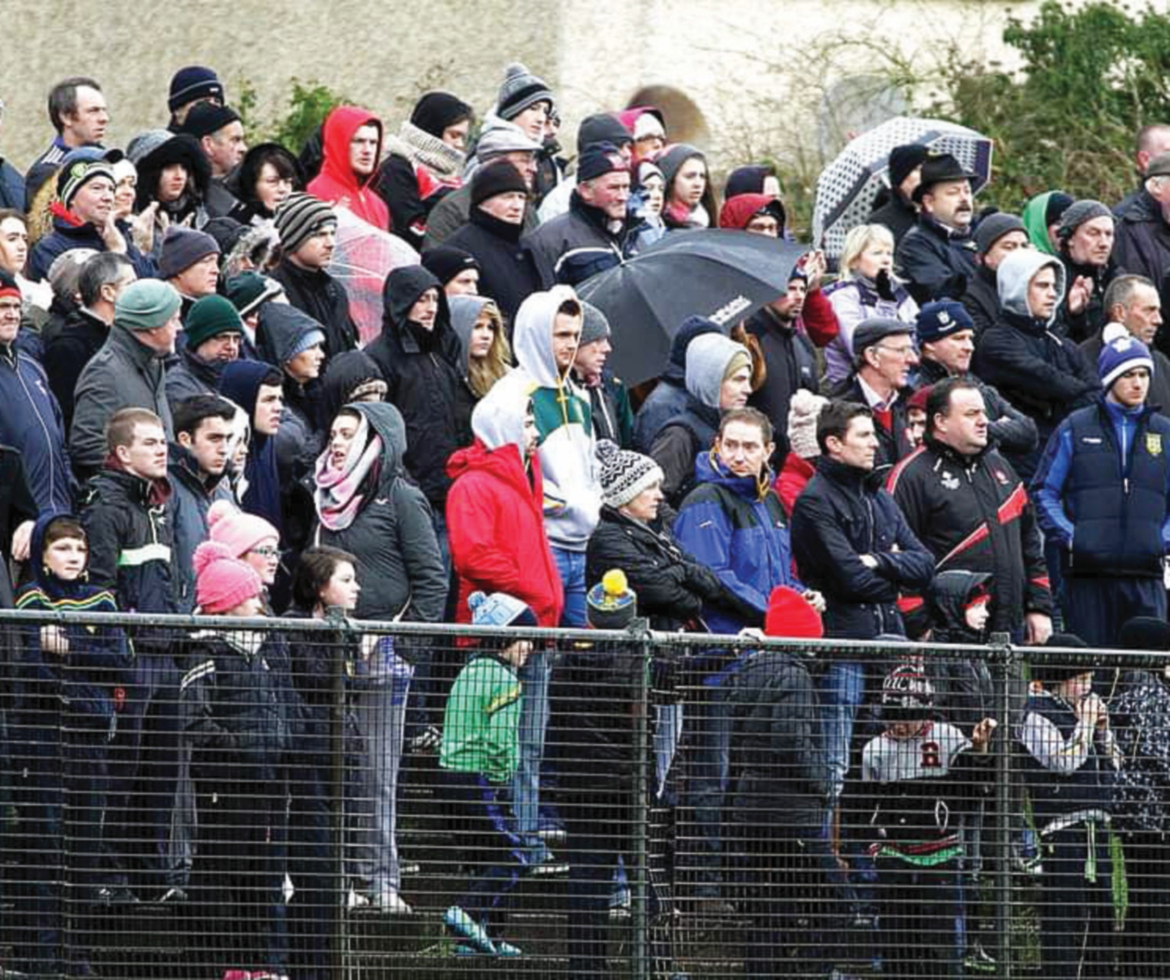For four decades, the cream of minor club football spent the Christmas period jostling for top spot in the St Paul’s tournament. Michael McMullan takes a look at its beginning and lasting legacy.
BRIAN Coyle always loved minor football. The entertainment on view always appealed to him. The open and free style pushed his buttons.
With his father Benny, Croke Park was a regular jaunt to see the brightest stars shine. While many fans filtered in as the main event got closer, Brian’s focus was simple.
“I would’ve always had gone in for the minor game,” he recalls, sharp as a tack in his early seventies.
More recently, Coyle has been the driving force behind the ladies’ team. Coaching is in his blood.
At the turn of the eighties, with a boys’ team, he coached a group from u-14, through u-16 until minor level. Nobody in Antrim was able to get the better of them.
It was time to test them against the best Ulster had to offer. A Dermot McNicholl-inspired Glenullin couldn’t be touched in Derry. And every county was the same.
“Ulster senior was the only time teams got playing further than their own county championships,” Coyle said of the early moment when his mind began to wander towards the minor competition that is a shining light in the underage calendar.
If you’re playing minor football in New Year’s Day in Belfast, you’ve a decent crop of players.
It was the same in 1982 when Coyle and Dr Pearse Donnelly had begun the groundwork. Why not? That was their thoughts on getting the ball rolling on the Ulster tournament.
They sat down with Irish News reporter Tony McGee to pick his brain of how to expand their idea across Ulster.
The Ulster Council dragged their heels initially, but Coyle and St Paul’s knew they were onto something worth pushing. Not being a fully-fledged championship, nine county champions was deemed too many by the hierarchy, but St Paul’s found a way.
“Tony, being a Fermanagh man, got in touch with Enniskillen Gaels with the idea of splitting the competition,” Coyle explained.
Coyle took chairman Liam ‘Joe’ McCartan to meet Ulster officials and a deal was brokered.
The five western counties would play off in Enniskillen, with the remainder in Belfast. The regional finals took place on St Stephen’s Day in the respective regions with the overall final taking place in St Paul’s on the traditional New Year’s Day slot.
And so the roots began to grow. In the days before email and the internet, every county board was contacted to find the identity of their minor champion before another call was made to offer the invite.
“The response was fantastic and everybody wanted to play in it and the first draw was in Tony McGee’s house,” Coyle recalled. “Every team that won their county championship wanted to play in it,so this was a step further.”
St Paul’s were 0-12 to 0-1 winners over Sarsfields in the Antrim minor final. When Antrim minors came from seven points down to see off Down in the 1982 Ulster final earlier that year and came marginally short to Kerry in the All-Ireland final, Brian Coyle was manager with a core of St Paul’s players on board.
St Paul’s were paired with Glenullin in the first round and Coyle remembers the crowd on the hill. It was packed with the Derry contingent.
“It got a bit robust, but nobody wanted to lose,” he said of the game, one that still sticks in Glenullin throats after feeling they were on the wrong end of some refereeing decisions.
It was a ‘Glen side that filtered into their Derry Senior Championship winning team three years later.
Newry Mitchells came in the next round, with captain Fergus Donnelly missing the game due to being on basketball duty in the Irish Super League.
“We beat Scotstown in the final and I played against a boy I played against at school for many years Bernie Murray. He wasn’t big, but he was a great player and a bit of a high fielder,” Donnelly recalls.
Fergus’ father Pearse was Brian Coyle’s right-hand man. He had a head for the game and was a great sounding board, but he was his own on the day of the final. Brian’s knee operation couldn’t wait.
“There were no mobile phones in those days,” Coyle recalls of a long afternoon of biting his nails in Musgrave Park Hospital
“I’m sitting and wondering how this match is going and the next thing the gang landed in on a trolley, pushed around with one of the guys sitting on it with the cup…with the nurses clapping and cheering.”
His dream was complete and, for the rest of Ulster, there was now a target for every county minor champion since.
“It was our ability to come back. We had plenty of grit and were hard to beat,” Fergus Donnelly said of his team.
“We didn’t really have any poachers, whereas some of the teams who came up to the tournament had players who’d score a goal in every game.
“We never conceded any goals, and I don’t remember us conceding a goal all year,”
Brian Coyle always loved Kerry. There was a romance about the Kingdom and he’d love nothing better than to drop into Kerry training to watch Mick O’Dwyer putting their golden generation through their paces.
The Easter after St Paul’s 1982 minor success, he loaded up the team and headed to Kerry for a weekend of fun and football.
Games against Kerry minor, East Kerry and Castleisland select teams came and went, but St Paul’s were unbeaten.
“I don’t remember how all the games went, but it was a mad weekend…brilliant craic,” was Fergus’ recollection.

IN THE LOUP…Derry champions Loup celebrate the first of their two titles in 1993
Back home, their newly incepted competition operated on a regional basis until a brawl at one of the games in Enniskillen had the St Paul’s committee in front of the Ulster Council.
A warning was followed by two stipulations. All games would be in Belfast where St Paul’s would be held fully accountable for anything going wrong and all referees had to be of county standard.
“We had to prove that we could run it all ourselves and have enough stewards to go around,” Coyle remembers.
Fergus Donnelly, who rarely misses a year of the tournament, spoke of the early years as the tournament took time to mature.
“Some of the clubs who came lacked a bit of discipline and there was the odd free for all,” he said.
As it became an established completion, clubs made the first move by contacting St Paul’s the minute they were crowned county champions.
Anyone who has ever been present during one of the pitch invasions on final day would witness the sheer delight as a group of players – and the club community – could pump out their chest and deem themselves an Ulster champion.
“Referees then stated ringing looking to referee in it,” Coyle said, highlighting another indication of the status in which it was held.
“We had some of the best referees in it; we Jimmy White coming from Donegal and Pat McEnaney from Monaghan.
“Mickey Convery, from Derry, was another…a gentleman and would’ve done anything for us. He’d have come and done a sideline at any of the games. He and Brendan Toland did a lot of refereeing for us.”
Coyle beams with pride at how the crowds continue to flock to watch the games. The past two years saw the GAA put the clampers on the competition due to the Covid lockdown. It didn’t stop clubs from across Ulster getting on the phone with plea getting gates open.
“When they had the 25th anniversary and saw all the players that went on to play for their county teams…that’s the success of the competition,” Coyle offers.
“People were coming up and telling us it was one of the best things we ever did, to get the competition up and running.”
Obstacles came and went, but St Paul’s is still a fixture. The u-17 debate forced change, but not closure. The MacRory Cup and MacLarnon Cup schedules led to negotiations, but a solution was always found.
“It is fantastic, a really well run tournament,” remarks Neil Coulter, a player with Burren in 1996 before returning to manage them to the title 20 years later. “To have it on over the holidays, it’s special to be on at that time of the year.”
Fergus Donnelly also knows its current value and the level of preparation. Very often teams are arriving two hours before the game, to walk the pitch before getting into the zone.
“If you come half-cocked and you don’t have your boys in bed early the night before, with a few boys out, you always pay the price,” the former winning captain said.
“You can see the teams in the initial rounds that didn’t take it too seriously and they always got put away, there is no hiding or no bluffing.”
Sometimes it’s not all smooth. When the clutch on the Sleacht Néill team bus went into meltdown on the motorway, a swift phone call saw a fleet of black taxis get the players to Shaws Road in time for a delayed throw-in against Mayobridge in 1999.
In some cases MacRory games were played nearby, allowing players to take in two games in one day. Barring the one or two occasions when snow won the battle, there was always a group of club members there to give the pitch the best chance.

CLOSE SHAVE…A late free saw Ballinderry edge out Scotstown to win their fourth title in 2008
When Ballinderry won their first title in 1996, Gerard Cassidy – who was joint Man of the Match in the Derry senior final the previous year – was the player of the final.
In the years before, the media speculated on the star player. This year was different. Anne Marie Donnelly, sister of Fergus, twin of Aidan and daughter of Dr Pearse passed away after suffering from spina bifita. Anne Marie was St Paul’s to the core. If there was a game, she’d have been at it and was a regular at the minor tournament. Every year since, her name is remembered with the Man of the Match trophy named in her memory.
A look at the list of winners is a who’s who of Ulster football with many of the clubs going on to win at senior level. Glen take on Kilcoo in next weekend’s Ulster senior final on the back of a remarkable four titles in succession.
Ballinderry also have four titles which bolstered their All-Ireland winning team of 2002 and almost two decades at the top in Derry.
When the Shamrocks pipped Scotstown with a late free in for their last title in 2008 (a year they also won Derry u-16 and senior titles), the Monaghan side had players like Kieran Hughes who went on to help them dominate the Farney senior scene.
You could literally write a book on the competition.
Chris Murphy scored 1-1 as Enniskillen saw off Pearse Óg in the 1998 and his father (Sean) was beaming with pride at how his son turned the game, vowing that the family should book a bus to the semi-final with Sleacht Néill. Sadly his father passed away, in the weeks after, on his 60th birthday.
“My memory is how welcome the club (St Paul’s) made us feel,” Chris said.
“Hence to say he never made the game but my whole family and the bus did. It makes me smile to think about this despite still having nightmares about marking Jim Kelly who was unplayable that day.”
That’s the impact the competition had on families and communities across Ulster. It was a marker of domestic greatness.
On another occasion, Rostrevor beat Kilrea in the 2005 final in a game that should never have been played. The driving hail – that forced this reporter to eventually put his notepad away – led to the referee calling across both managers. Rostrevor were leading and both managers gave the green light to continues.
Rostrevor won, but one of the subs who came on had to be replaced and taken to the showers, such was the Baltic conditions.
Kilrea would return two years later with a group of players that – far an All-Ireland Féile defeat – were unbeaten through their entire careers.
There was the Loup team managed by the legendary Colum Rocks, that made up the prized chapter of his golden scrapbooks of cuttings his nephew Ronan now holds after this passing.
“Glen were a fantastic team,” Coyle states about the competition’s most decorated group.
On a personal level, the win over Glenullin in 1982 and coming through against Killybegs are among his favourite memories.
“Then there were the games between Enniskillen v Maghery (in 1988) when there was two or three replays,” he said.
“They could have had extra time in both replays…and Enniskillen pipped them, I think it was a semi-final and they went on to win it. There are so many memories.”
By the time Burren arrived to take on Kilrea in the decider on New Year’s Day 2017, they club added the Paul McGirr Cup (Ulster u-16), back to back Ulster u-21 titles in Creggan to their five Ulster Senior Championships.
Their manager Neil Coulter was on their 1996 minor team that went down by a point to eventual runners-up Killeavy, who he would manage some years later, in the quarter-final despite not being the fancied horse in Down.
Clonduff had “eight or nine” county minors and hammered Burren by north of 20 points in the league before being overturned when the sides met a week later in the championship quarter-final.
“We weren’t expected to win Down at the time we were really looking forward to going down to Belfast,” he recalls.
“It was a big occasions for us to be playing in an Ulster Championship.”
As manager, his side lost out to Southern Gaels in the 20014 semi-final, a team who took Glen to extra-time before the Watties clinched their fourth successive title.
“There were six or seven boys who came back (in 2016) and the experience was massive,” Coulter admits of Burren’s learning curve.
“It stood to us two years later. They knew the run down the road, the pitch and the changing rooms.”
Victory over Kilrea gave Burren their first Ulster minor success and the unique record of being the only club to hold Ulster titles at u-16, minor, u-21 and senior level.
“We didn’t think much about it at the start,” Coulter admits. “Then a couple of ones in the club mentioned it and it became a bit of motivation for the players.
“The night going back to the club was a huge occasion. It was New Year’s Day, there was a disco on in the club and the reception we got when they came home was unbelievable.”
Burren are back this season among the chasing pack. Will they win it? Who knows? But it will be another enjoyable Christmas in Belfast with communities beaming with pride.
Thank God for men like Brian Coyle, Pearse Donnelly and Tony McGee.

SHOULDER TO SHOULDER…Burren minors’ win in 2016 completed the sweep of Ulster senior, u-21, minor and u-16 in the club
ROLL OF HONOUR
2022 ???
2021 No competition
2022 No competition
2019 Lavey
2018 Bellaghy
2017 Enniskillen
2016 Burren
2015 Crossmaglen
2014 Glen
2013 Glen
2012 Glen
2011 Glen
2010 Lamh Dhearg
2009 Omagh
2008 Ballinderry
2007 Kilrea
2006 Coalisland
2005 Errigal Ciaran
2004 Rostrevor
2003 Armagh Harps
2002 Clontibret
2001 Ballinderry
2000 Pearse Óg
1999 Cavan Gaels
1998 Sleacht Néill
1997 Ballinderry
1996 Ballinderry
1995 Loup
1994 Bellaghy
1993 Loup
1992 Ballyshannon
1991 Bellaghy
1990 Dungiven
1989 Dungannon
1988 Enniskillen
1987 Killeavy
1986 St Paul’s
1985 Killybegs
1984 Killybegs
1983 Saul
1982 St Paul’s
Receive quality journalism wherever you are, on any device. Keep up to date from the comfort of your own home with a digital subscription.
Any time | Any place | Anywhere












